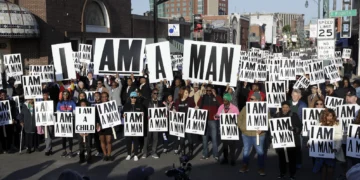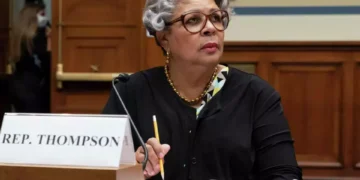Feb 18, 2025 Story by: Editor
WASHINGTON (AP)—Evelyn Seabrook managed to purchase a home despite having only a high school diploma. Glenn Flood climbed the career ladder, eventually becoming a public affairs officer for former Defense Secretary Donald Rumsfeld. Similarly, Calvin Stevens built a dual career in the military and federal service, reaching high-ranking positions in both fields.
Now in their late 70s and early 80s, Seabrook, Flood, and Stevens belong to a generation of Black Americans who leveraged military and federal civil service careers to achieve economic stability. While they acknowledge facing obstacles, they believe these institutions offered them more opportunities than the private sector, where racial discrimination and patronage were widespread at the time they entered the workforce.
“I am glad I chose to be in federal service,” Seabrook said. “Even with all the drawbacks, my personal life was enhanced by my federal job.”
Together, Seabrook, Flood, and Stevens have accumulated over 120 years of military and federal service. As active members of the National Active and Retired Employees Association, they remain attuned to the pressures facing federal employees under President Donald Trump’s second term. The administration’s policies have included dismantling diversity, equity, and inclusion programs and reducing the federal workforce under the leadership of Elon Musk, who serves as a special adviser and head of the Department of Government Efficiency, or DOGE. Musk has also pushed for the elimination of federal agencies.
They stress that these measures overlook the historical role of the federal workforce in creating pathways to the middle class for minorities, especially Black Americans.
Speaking from their homes in Orlando, Florida; Decatur, Georgia; and Palm Springs, California, the retirees emphasized that, in their era, the focus was not on diversifying the workforce but rather on dismantling discriminatory barriers that excluded qualified people of color from many workplaces.
Former President Lyndon Johnson tackled employment discrimination through legislation and executive orders, which expanded opportunities in the U.S. Postal Service, the military, and other federal jobs. These measures provided Black professionals their first real chance to pursue executive-level careers, said Marc Morial, president and CEO of the National Urban League.
“The progress in federal civilian employment was far faster and far greater than it was in the private sector,” Morial explained, noting that private industry was “far slower to create the opportunity to run nondiscriminatory hiring practices.”
As a result, the Black middle class grew, particularly in Washington, D.C., where many Black workers entered the system at lower levels and advanced based on merit.
“At one point, DC had the highest median income for African Americans in any city in the country,” Morial said.
Currently, the federal government remains the largest employer in the U.S., with around 3 million workers, including 600,000 in the U.S. Postal Service. While Black Americans make up nearly 14% of the U.S. population, they constitute nearly 19% of the federal workforce.
Proud of Being Hired and Promoted on Merit
Seabrook, 80, started her career with the Social Security Administration in New York City in 1966 and dedicated over 39 years to federal service.
Reflecting on her experience, she finds it ironic that diversity, equity, and inclusion (DEI) initiatives are now being used to discredit Black professionals. She pointed out that affirmative action or special recruitment programs did not exist when she entered the workforce.
“The only initiatives I have seen was if you were a veteran” and points were added to test scores, she recalled from her Florida home. “In terms of ethnicity, culture, race, that wasn’t even part of the picture. We weren’t thinking about it then.”
Even the Civil Rights Act of 1964 had yet to make its full impact when she began her career. Seabrook secured her roles through testing and interviews rather than through preferential programs.
“Preferences weren’t part of my life or how I got promoted or not. I got promoted because I could understand the work. I never went in under incentive programs.”
Despite encountering challenges, including filing complaints with the Equal Employment Opportunity Commission, she continued to advance and even mentored new employees.
“It certainly was very helpful in me maintaining a level of living that I probably could not have done elsewhere,” Seabrook said.
Middle-Class Life Not Something to Take for Granted
Flood, 78, served as a Navy officer, a reservist, and a Pentagon official who regularly briefed former Secretary of Defense Donald Rumsfeld. He credits federal service with allowing people of color to demonstrate their abilities.
He finds the current climate concerning, particularly the administration’s efforts to downsize the federal workforce and dissolve agencies.
“There’s important work out there, and not everything is in D.C.,” he said from his home in the Southern California desert.
He noted that the Department of Defense, where he previously worked, has ceased recognizing Black History Month, Native American Heritage Month, and other cultural observances. He believes acknowledging such histories is essential to illustrating progress.
His father had also served in the Navy but was restricted to a steward role due to racial barriers.
“I am very proud of my civil service and my Navy career” and its role in his “middle-class life,” Flood said. “That was not something you could take lightly.”
Saddened to See the Civil Service Under Attack
Stevens, 77, dedicated 31 years to the Air Force and Air Force Reserves, alongside over three decades at the General Services Administration. Like his peers, he acknowledges facing difficulties but benefited from strong mentorship throughout his career.
Determined to advance, he proactively sought additional training, often paying for courses himself. His goal was to set an example for others and advocate for recruitment efforts targeting Historically Black Colleges and Universities in the Atlanta area, where he was based and still resides. He recalled that many Black professionals entering federal service held advanced degrees.
While some may have perceived him as an affirmative action hire, he emphasized his qualifications.
“I met the qualifications,” he said. “I was educated and I was trying to advance, taking classes on my own” to train and prepare for each position he pursued.
Stevens feels deeply grateful for the opportunities his federal and military careers provided but is disheartened by the current political climate.
“A lot of people went to the federal sector because that was a middle-class opportunity,” he said. “Some did have degrees and some did not, but they felt that the government, their positions, were secure. They had benefits and they felt that they had a fair opportunity for promotion.” Source: Burnaby Now

















